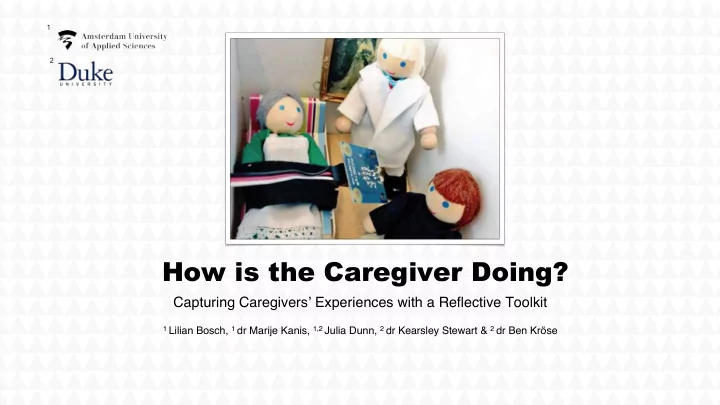

1 2 How is the Caregiver Doing? Capturing Caregivers’ Experiences with a Reflective Toolkit 1 Lilian Bosch, 1 dr Marije Kanis, 1,2 Julia Dunn, 2 dr Kearsley Stewart & 2 dr Ben Kröse
The informal caregiver
From managing care to designing for well-being
From managing care to designing for well-being How is the caregiver doing?
The National Alliance for Caregiving stated (2013) “There is an ongoing need for research on family caregivers , especially as technology dramatically impacts caregiving. More current, thorough and accurate data is needed about the diversity of caregiver roles and responsibilities, about what caregiving involves day-to-day and the nature of the burden it represents, and how much it impacts those around the caregiver.”
Co-Care-KIT Reflective Toolkit for informal caregivers
What’s in the box?
1. Custom designed Journal
2. Photo based experience sampling app
3. Heart Rate tracker Wearable on wrist
Field study with informal caregivers
Study population and collected data Relation to Hours spent Duration of Heart rate Health concern(s) Photos Journal Participant Gender Age care caregiving field study tracking of care recipient collected kept recipient(s) per week (days) (days) Dementia, Son/ son in osteoporosis and P1 M 63 3-8 8 30 7 Yes law visual impairment Stroke, P2 F 36 Daughter 8-16 14 32 1 Yes stroke paralysis P3 F 35 Spinal cord injury Neighbor <3 14 30 11 Yes Dementia, P4 F 57 Daughter 8-16 11 42 3 Yes osteoporosis Amyotrophic Lateral P5 F 23 Daughter 3-8 12 17 1 Yes Sclerosis (ALS) Grand- P6 F 22 Old Age, frailty 8-16 7 25 3 Yes daughter P7 F 26 Chronic pain Daughter 8-16 14 23 5 Yes
Collaborative reflection between researcher and caregiver Heart rate & photo sampling combined
Outcomes?
People generally liked the kit
"I liked the journal a lot. It made me realize what happens and who are important to me. Writing down my days made me realize how much I accomplish in a day."
1 Enabled reflection on day-to-day needs and experiences
“She knows everyone, including me, has a lot on our plates, so when I take my time with her and don’t rush her through the store she is really appreciative and that makes me feel good about it.”
2 Increased caregivers’ awareness of their own well-being
"From the kit I learned that I spend WAY more time caregiving than I thought”. … “I am going to push harder to get more formal help.”
3 Empowered caregivers to share their role and experiences within their social networks
“I’m never very explicit about being a caregiver, but I noticed that when I was doing this study, that people automatically asked me about it. Because I was taking photos and wearing the heart rate wristband. ” They said: “Oh, I didn’t even know that you were a caregiver”. It felt good to be able to tell them, to be honest.”
4 Enabled capturing positive experiences
"The kit helped to focus more on the positive, instead of thinking about the practical things you did that day (e.g. cleaning), you remember the feeling you had better."
5 Provided reassurance about their own mental health
“From the photos I learned that I like where I am and I like what I do, during caregiving.”
dr MARIJE KANIS HCI for positive impact Contact: m.kanis@hva.nl How is the Caregiver doing? Capturing Caregivers’ Experiences with a Reflective Toolkit Lilian Bosch, Marije Kanis, Julia Dunn, Kearsley Stewart & Ben Kröse Amsterdam University of Applied Sciences | Duke University
1 The Co-Care-KIT… • enabled reflection on day-to-day needs and experiences • increased caregivers’ awareness of their own well-being • empowered caregivers to share their role and experiences within their social networks • enabled capturing positive experiences • provided reassurance about their own mental health
1 Dynamic conditions affecting caregivers’ well-being • How the care recipient is doing • Uncertainties and unawareness • Increased responsibility • Talking about the care role and responsibilities to others
Recommend
More recommend